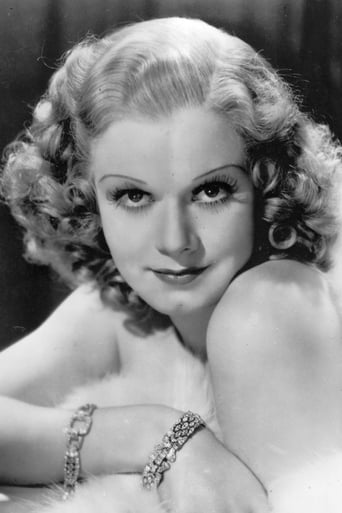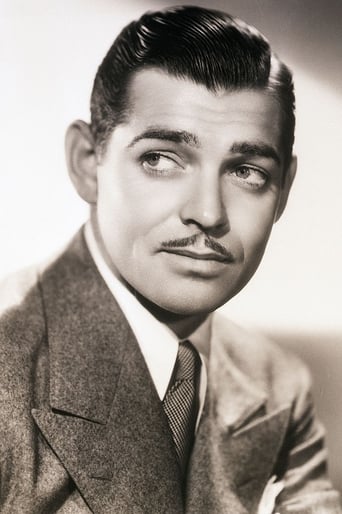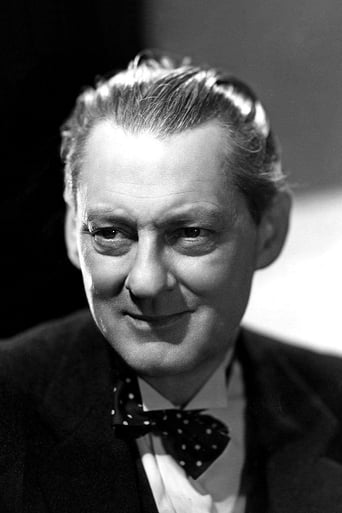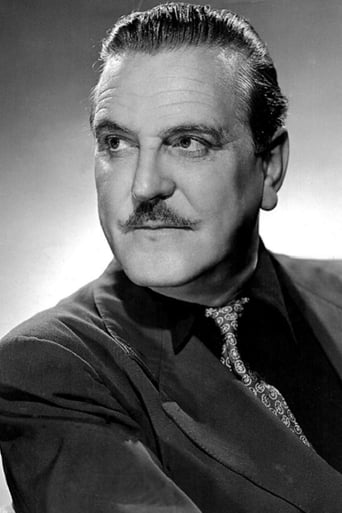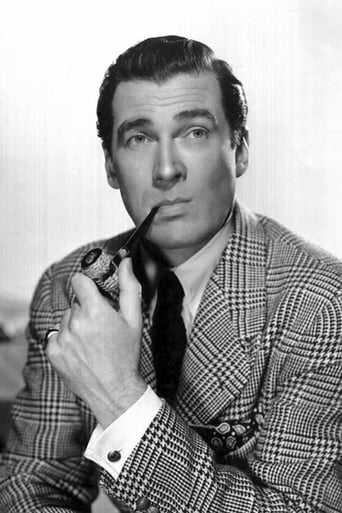lugonian
SARATOGA (Metro-Goldwyn-Mayer, 1937), directed by Jack Conway, is a lighthearted comedy with some sadness attached to it. Jean Harlow, it's leading lady, never reached the finish line for this one, having died before completion got underway. Cast for the sixth and final time opposite Clark Gable, this was easily their breeziest assignment together. Walter Pidgeon, making his MGM debut, rounds out the trio playing the other man competing for his girl's affections.With full indication of a horse racing story, the film's introduction starts off with the camera capturing the full view of racing hoofs as jockeys ride up the racetrack before the rising dust covers the screen as the credits roll to upbeat swing music of unseen vocalist belting out its title tune. Fade in begins at Saratoga's Brookvale Farm where Grandpa Clayton (Lionel Barrymore), a horse-breeder, is disappointed that his son, Fran (Jonathan Hale) has sold off his stallions to banker Ed Kenyon to cover up his financial losses. Because Clayton owes $60,000 back debt to best friend and bookmaker, Duke Bradley (Clark Gable), he offers him the mortgage deed to his property as security. Clayton's daughter, Carol (Jean Harlow), while in London, has become engaged to Hartley Madison (Walter Pidgeon), a wealthy New York stockbroker who had taken Duke for $50,000 at Belmont. While at the races, Clayton suffers a fatal heart attack shortly after Carol's return. As Carol calls for Duke to sell her back the farm, he refuses so not to foreclose on her grandfather. Intending on having Hartley give her the money to pay off Duke, Duke has other plans on getting back his losses. Regardless of trying to outbid the rich "sucker" at both auction and racetracks, Carol arranges in keeping Bradley one step ahead of Duke.Taken from an original screenplay by Anita Loos and Robert Hopkins, the plot revolving around a snobbish girl engaged to a millionaire and becoming attracted to a smooth talking bookie was typical movie-making in the 1930s. Considering the plot being ordinary, the winning combination of Gable and Harlow makes SARATOGA all its worth. With the finished product not going according to plan due to Harlow's untimely death, how the writers managed to work around her character is more interesting than the story itself. Aside from extended use of supporting players Una Merkel (Fritzi, Duke's old flame), and Frank Morgan (Jesse Kiffmeyer, Fritzi's jealous husband allergic to horses), there's also noticeable out-takes revolving around the real Harlow and those featuring her double with face covered by large hats and camera capturing her discreetly from the back. The frequent mention of Carol's illness was certainly an excuse by not keeping her in full view. One surviving scene where Harlow's Carol, examined by Doctor Hanerstein Beard (George Zucco), constantly telling him, "I'm perfectly well. There's nothing the matter with me," comes across as too close for comfort, considering the actual circumstances of her being gravly ill during filming. On the lighter side, Harlow demonstrates her flare for comedy in a memorable scene where she claims to have picked up cigar smoking to avoid any detection of Duke's presence in her room (who's hiding underneath her bed) from her fiancé' Bradley, after noticing the burning cigar resting on her ashtray. Gable comes across as very likable through his constant catch phrase to everyone, male or female, "I love you." When Carol uses it on Duke, he replies amusingly, "Hey, what are you trying to do, steal my gag line?" In between the battle of wits come song interludes by Walter Donaldson, Robert Wright and Chet Forrest: "Saratoga" (sung by Grace Saxon and the Four Esquires); "The Horse With the Dreamy Eyes" (sung by Cliff Edwards, Una Merkel, Clark Gable and Hattie McDaniel); "Saratoga" and reprise of "The Horse With the Dreamy Eyes." The Horse song, set on the "The Racing Special" train bound to and from Miami, is noteworthy as one of the rare cases where Gable participates in a song, and quite good at that.Rounding out the cast of co-stars include Hattie McDaniel as Rosetta Washington, Harlow's maid; Cliff Edwards as "Tip" O'Brien; Frankie Darro the jockey, Dixie Gordon; and Margaret Hamilton appearing as the homely woman on the train seated next to Jesse (Morgan), founder of Harriet Hale Beauty Cream. Lionel Barrymore, a reliable actor, is nearly unrecognizable with his Claude Gillingwater Sr.-type performance playing the aging grandpa sporting silver hair and droopy mustache.Regardless of title, not every scene takes place in Saratoga, but at Tropical Park in Miami, Florida, and at Churchill Downs in Louisville, Kentucky. Highlighting with a horse race sequence between Moonray and Dubonnet leading to a photo finish, SARATOGA concludes with its own photo finish with that of Jean Harlow (1911-1937) in a fond farewell to her work. To echo those words of Gable's Duke Bradley, fans would gladly say, "Jean, we love you." Formerly available on video cassette in the 1990s, SARATOGA is certainly a sure bet whenever presented on Turner Classic Movies. (*** markers)
sbibb1
Saratoga was not a great film. It has some clever and witty moments, such as the scene where Harlow is caught smoking a cigar, but on the whole the film is not among the best work of the wonderful cast which includes: Jean Harlow, Clark Gable, Lionel Barrymore and Walter Pigeon. Harlow died before she completed filming this movie after a supposed illness which lasted 10 days. Watching the film you can see how unenergetic she looks, how puffy and tired and knowing that she does not live to finish the film casts the film in a poor light. When Harlow died, it was reported in the press that the film would be scrapped and left unfinished....but Louella Parsons reported in the press a few days after Harlow's death that the public outcry had been so great that MGM had decided to release the film. Being realistic here, it is hard to believe that MGM would ever seriously consider scrapping the film....the film had already cost millions and had other big name stars in the film. Parsons reported that the role played by Jean Harlow would be filled by actress Rita Johnson, and that at the point in the filming where Harlow died, co-star Lionel Barrymore would film an introduction announcing that Harlow had passed and that the film would be completed by another actress. None of this happened. There was no intro by Barrymore, and the role was taken over by actress Mary Dees. Dees was described in the press as having been both a $55 a week dancer at Warner Brothers, and also was said to have been pulled from a picture that she was shooting at Paramount with Bing Crosby to finish the role.It is laughable to see the new actress in the role. At the point at which Harlow dies in real life, her character on the screen seems to almost vanish too. When she is shown, she is shown from the back, or with binoculars to her face, or a laughable scene with Hattie McDaniels where she is wearing a huge hat with a wide gauzy brim which obscures her face. This all makes what already was not a stellar film, get even worse. It is hard to say how the film would have been had Harlow lived. There is no question that her role would have been much larger.In a macabre twist, in the scene where Jean Harlow is being examined by the doctor played by George Zucco, the gown she is wearing, white and with puffy sleeves, was the gown she was buried wearing.

